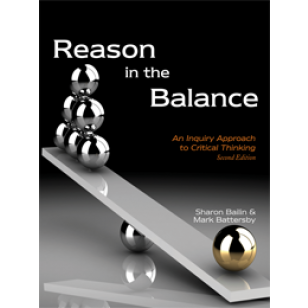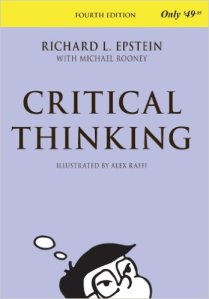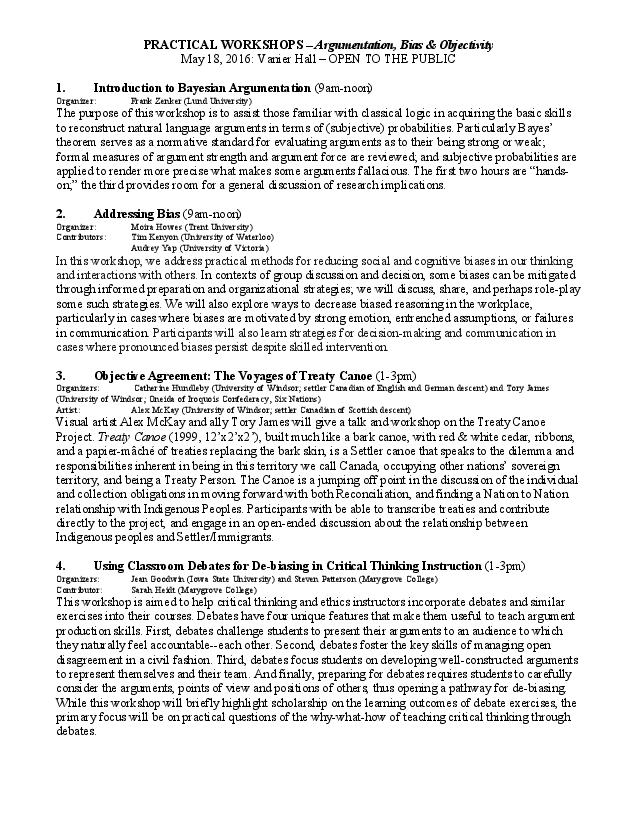This term I taught from Douglas Walton’s Fundamentals of Critical Argumentation (Cambridge UP, 2005) and I was excited to do so. I’m a big fan of Walton’s pragmatic approach to argumentation for it’s ability to make sense of fallacies and it’s pluralism — the convergence of which I will be exploring more in my own research and which I think are both valuable for education. Teaching from this comprehensive text promised to immerse me and the students in Walton’s vision.
I knew of some limitations of Walton’s text from my own perspective, including the almost complete reliance on manufactured examples. I appreciate, and rely on, manufactured examples to provide maximally clear and uncontroversial exemplars of aspects of argumentation, but they also may mislead students into thinking that argument analysis can and should be cut and dried when it is not. That false belief also can encourage students to think that the application of the analysis they know trumps other forms of interpretation which can make logic a type of bullying tool, even a tool of domination (without anyone having such domineering intentions).
 My way of addressing this problem (and some of the course’s content requirements) was to supplement Walton with Mark Battersby’s Is that a Fact? A Fieldguide to Statistical and Scientific Information (most recent edition Broadview, 2016). Battersby’s book provides rich detail in its treatment of real examples and many of the themes overlap, allowing for what promised to be a healthy yin and yang approach. Battersby’s book had also been recommended to me by a friend who teaches CEGEP in Quebec.
My way of addressing this problem (and some of the course’s content requirements) was to supplement Walton with Mark Battersby’s Is that a Fact? A Fieldguide to Statistical and Scientific Information (most recent edition Broadview, 2016). Battersby’s book provides rich detail in its treatment of real examples and many of the themes overlap, allowing for what promised to be a healthy yin and yang approach. Battersby’s book had also been recommended to me by a friend who teaches CEGEP in Quebec.
Unfortunately, I hadn’t realized Battersby provides no exercises (maybe the new edition does?), and that made it hard to integrate Battersby’s deep theoretical treatment of concrete cases with the logic of argumentation. The course began to seem disjointed and Battersby ended up getting less use that I’d hoped.
Walton too was disappointing. Some difficult subjects were covered too briefly and not only with only abstract examples but with very few examples for practice. This is the flipside to the comprehensive nature of Walton’s theory: he covers not only argumentation schemes — his stock in trade, but the larger context of dialogue types and the more traditional analysis of argument diagramming and even a dash of formal logic.
I do think the students learned much of what I intended, though I am more conscious of these intentions now. The dialogical context of argumentation orients both Walton’s and Battersby’s approaches, but it also complicates the teaching of reasoning. I believe now that it cannot be taught at the introductory level with real examples. The closest way to do so may be with Tindale’s Fallacies and Argument Appraisal (Cambridge U P, 2007), an extension of Walton’s approach but restricted by a set of inference schemes that receive deep treatment.
 In the future, for a general course on reasoning, I will look to Battersby and Sharon Bailin’s book Reason in the Balance: An Inquiry Approach to Critical Thinking (now in an affordable Hackett edition too! 2016). I have heard nothing but good things about this book, and I know it contains substantial examples and exercises. I many have to give up on the desire for real examples (I’m not sure yet). I did this too when I used Brian L. Epstein’s Critical Thinking (Advanced Reasoning Forum), which makes develops a cartoon world to provide artificial restrictions on the interpretation of argument examples. Originally I laughed at this, but I found it extremely valuable.
In the future, for a general course on reasoning, I will look to Battersby and Sharon Bailin’s book Reason in the Balance: An Inquiry Approach to Critical Thinking (now in an affordable Hackett edition too! 2016). I have heard nothing but good things about this book, and I know it contains substantial examples and exercises. I many have to give up on the desire for real examples (I’m not sure yet). I did this too when I used Brian L. Epstein’s Critical Thinking (Advanced Reasoning Forum), which makes develops a cartoon world to provide artificial restrictions on the interpretation of argument examples. Originally I laughed at this, but I found it extremely valuable.
Many demands must be balanced in developing a critical thinking course, but good examples have to be a priority. That often requires artificial examples and the challenge is to transition from the artificial to the real, in the hope that will encourage “knowledge transfer” — a concept I hope to learn more about so that I’m doing less guess-work in my pedagogy. I think I’ll start here.





 My way of addressing this problem (and some of the course’s content requirements) was to supplement Walton with Mark Battersby’s
My way of addressing this problem (and some of the course’s content requirements) was to supplement Walton with Mark Battersby’s 
 In the future, for a general course on reasoning, I will look to Battersby and Sharon Bailin’s book
In the future, for a general course on reasoning, I will look to Battersby and Sharon Bailin’s book 